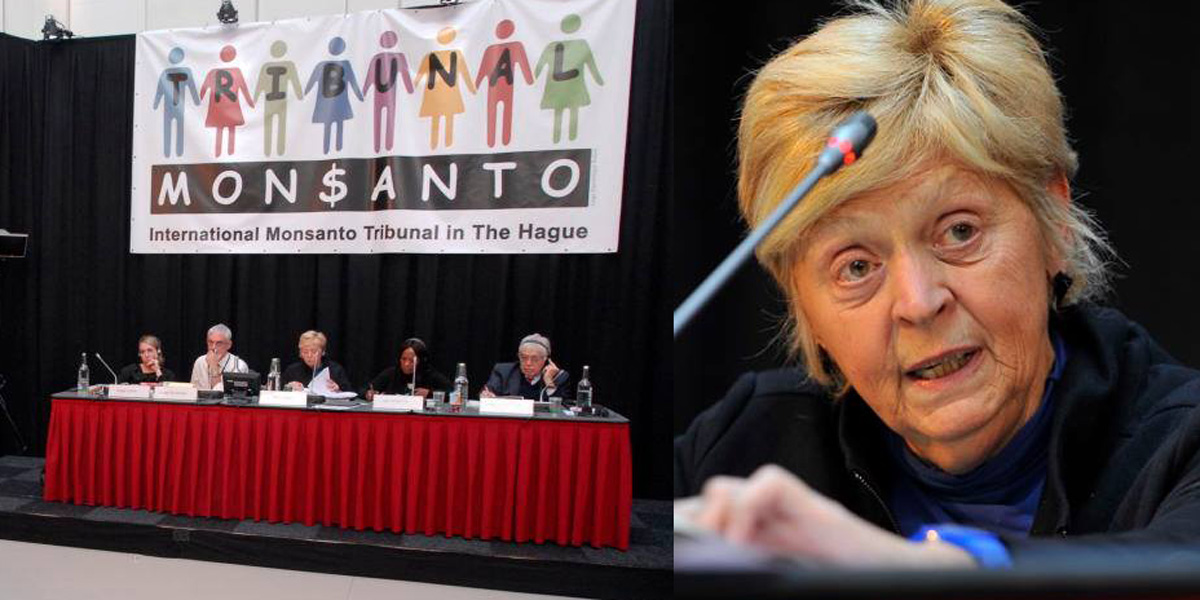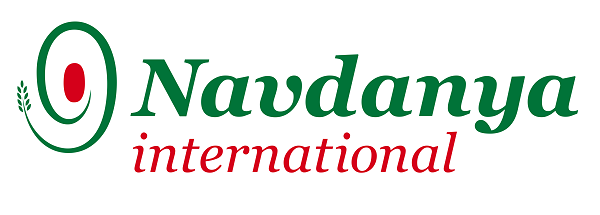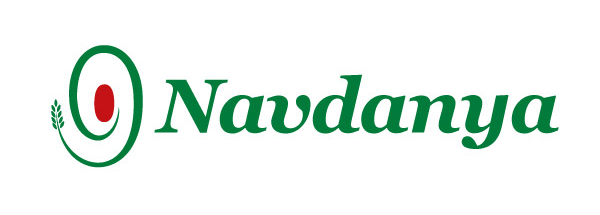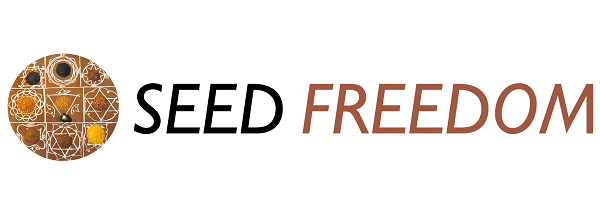GMWatch, 17 October 2016

Judge Françoise Tulkens is the chair of the Monsanto Tribunal, which opened in The Hague this weekend. Interviewed by journalist Rémi Barroux in Le Monde, Tulkens explains the legal context of the Tribunal and its potential consequences. English translation: GMWatch
The chair of the Monsanto Tribunal, Judge Françoise Tulkens, who heard witnesses in The Hague on Saturday 15 and Sunday 16 October, hopes to contribute to the development of international law by the inclusion of new issues, in particular ecocide.
Tulkens was a judge for fourteen years at the European Court of Human Rights – she was even the Vice President – and was appointed in September 2012 to the Human Rights Advisory Panel of the United Nations in Kosovo.
What is the purpose of this Monsanto Tribunal that you have agreed to chair?
Françoise Tulkens: We will hear witnesses for two days, familiarise ourselves with the many items in the file, including scientific studies, and we five judges will deliberate amongst ourselves in order to issue an “advisory opinion”. Six questions have been put to us regarding rights that are recognized by international law, such as the right to food, the right to a better state of health, and the right to the freedom that is indispensable for scientific research.
These rights are notably enshrined in the International Covenant on Economic, Social and Cultural Rights, as well as the Convention on the Rights of the Child and the International Convention on the Elimination of All Forms of Discrimination Against Women. Other international instruments also exist, such as the UN Principles and Guidelines on Business and Human Rights, as approved by the Council of Human Rights in a resolution of June 2011.
Does this mean that you have the legal tools to condemn Monsanto?
We will not pronounce judgment. We will give an advisory opinion. Specifically, we will check if Monsanto’s activities are in compliance with the laws as they exist in the UN legal instruments that I mentioned. We are therefore not a court that condemns a criminal nor one that judges a fault in civil law.
Monsanto, in an open letter, denounced the tribunal as a “masquerade” with a “pre-determined outcome”. What do you think?
I read this open letter and what it suggests is incorrect. Monsanto will not be condemned in advance, since it will not be condemned at all. This is not the place for that. There will not even be a moral condemnation, because a court does not deal in morality. It is an educational tribunal, which I hope will influence international human rights law and allow openings for victims.
I only regret the absence of Monsanto, even if its absence is both understandable and predictable. It is important to point out that Monsanto was invited several times to participate, and that all facilities were offered to allow it to argue its point of view.
But if Monsanto is not really being tried, what is the scope of this tribunal?
The Monsanto Tribunal is a way for civil society to take the initiative to give a voice to witnesses, to enable the public to understand the impacts of Monsanto’s activities, and to help advance international law by offering new ideas, such as the responsibilities of business regarding human rights, or new concepts. This is a difficult but essential education.
The Russell Tribunal [also known as the International War Crimes Tribunal], made in the context of the Vietnam War in 1966, was also a tribunal of opinion. It is important to refer to this history. Our opinion, which we will try to deliver before 10 December, International Human Rights Day, will be sent to Monsanto and the United Nations. From this legal opinion, other jurisdictions can be involved and other judges will step in. As for us, we have seen, heard, taken note, and deliberated. And without doubt, new questions, such as those concerning ecocide, could be taken into account by international law.
What do you mean by “ecocide”?
This offence still does not exist and in order for that to happen, it first has to be precisely defined. Genocide is a crime against humanity aimed at the partial or total destruction of a group of persons because of their national, ethnic, racial or religious characteristics. Ecocide would be a “genocide” committed against the environment, environmental damage that would alter in a serious and long-lasting way the ecosystems upon which human life depends. The International Criminal Court here in The Hague has just decided, on 15 September, to include concerns about the environment in its field of investigation, so that is evolving.
The issues of access to water and to a healthy diet are old. They are not new issues generated in the minds of angry activists. And these issues, such as the right to a healthy environment, are likely to become increasingly important with climate change. It is our duty to put the legal tools in place to deal with these problems. The Monsanto Tribunal is a step and a tool in this process.
The original French article in Le Monde, “Quel est le contexte juridique du vrai-faux « procès » de Monsanto ?”, by Rémi Barroux, is here:
http://www.lemonde.fr/planete/article/2016/10/16/nous-allons-verifier-si-les-activites-de-monsanto-sont-en-conformite-avec-les-regles-de-droit_5014553_3244.html
Giudice del Tribunale Monsanto ne spiega il significato e le implicazioni
GMWatch, 17 ottobre 2016
La giudice Françoise Tulkens è la presidentessa del Tribunale Internazionale contro Monsanto che si é tenuto a L’Aia questo fine settimana. In un’intervista da parte di Rémi Barroux per Le Monde, la Tulkens spiega il contesto legale del Tribunale e le sue potenziali implicazioni.
La presidentessa del Tribunale contro Monsanto, giudice Françoise Tulkens, che sabato 15 e Domenica 16 Ottobre ha ascoltato I testimoni a L’Aia, spera di contribuire allo sviluppo del diritto internazionale tramite l’inclusione di nuove questioni scottanti, in particolare l’ecocidio.
La Tulkens è stata giudice per quattordici anni alla Corte Europea dei Diritti Umani (ne é addirittura stata Vice Presidente), ed è stata designata al Comitato Consultivo per I Diritti Umani delle Nazioni Unite in Kosovo nel settembre 2012.
Qual’è lo scopo di questo Tribunale Internazionale contro Monsanto che avete accettato di presiedere?
Françoise Tulkens: Ascolteremo testimoni per due giornate, acquisiremo dimestichezza con il vasto materiale contenuto nel file (ricerche scientifiche incluse), e noi cinque giudici ci riuniremo in consiglio per deliberare una “advisory opinion”. Ci sono state poste sei domande riguardo la sfera dei diritti riconosciuti dal diritto internazionale, come ad esempio il diritto all’alimentazione, il diritto ad una salute migliore, ed il diritto alla libertà che è indispensabile alla ricerca scientifica.
Questi diritti sono sanciti in maniera particolare nel Patto Internazionale sui Diritti Economici, Sociali e Culturali, oltre che nella Convenzione sui Diritti del Fanciullo e nella Convenzione Internazionale sull’Eliminazione di ogni forma di Discriminazione contro le Donne. Vi sono anche altri ‘strumenti’ legali internazionali, come I i Principi Guida su Imprese e Diritti Umani delle Nazioni Unite, approvati nel Giugno 2011 tramite una risoluzione dal Consiglio dei Diritti Umani.
Tutto ciò significa che possedete I mezzi legali per condannare Monsanto?
Noi (giudici) non pronunceremo un verdetto. Avanzeremo una “advisory opinion”. Più specificatamente, verificheremo se le attività della Monsanto risultano conformi alle leggi cosi come esse esistono all’interno della gamma di strumenti legali delle Nazioni Unite che ho menzionato prima. Pertanto non costituiamo una corte che può ad esempio condannare un criminale o che ha il potere di giudicare errori all’interno del diritto civile.
In una lettera aperta la Monsanto ha sminuito il Tribunale come una “messinscena” con un “verdetto già prestabilito”. Cosa ne pensate?
Ho letto la lettera in questione, e ciò che essa suggerisce non è corretto. La Monsanto non ‘partirà svantaggiata’, cioè già condannata, in quanto non verrà affatto condannata. Questo non è il luogo designato per questo scopo. Per di più, non vi sarà nemmeno alcun tipo di condanna morale, in quanto una corte non si occupa di moralità. Si tratta di un tribunale pedagogico, che spero andrà a influenzare il diritto internazionale sui diritti umani ed a concedere spazio alle voci delle vittime.
Rimpiango solamente l’assenza (di un qualsiasi rappresentante) della Monsanto, nonostante quest’assenza sia tanto comprensibile quanto prevedibile. Ritengo sia importante sottolineare che è stato proposto a Monsanto svariate volte di partecipare, e che sono state offerte disposizioni specifiche per permettere alla delegazione Monsanto di presentare la propria opinione ed avanzare la propria difesa.
Ma se la Monsanto non è veramente sotto accusa, qual’è lo scopo finale del Tribunale?
Il Tribunale Internazionale contro Monsanto è un mezzo tramite il quale la società civile ha potuto prendere l’iniziativa di dare una voce ai testimoni, di permettere al pubblico mondiale di capire l’impatto delle attività della Monsanto, e di aiutare ad avanzare lo sviluppo del diritto internazionale offrendo nuovi spunti, come ad esempio riguardo la responsabilità delle corporazioni riguardo ai diritti umani, o altre idee ancora. Si tratta di un tipo di educazione difficile, ma essenziale.
Anche il Tribunale Russel [noto anche come Tribunale Internazionale sui Crimini di Guerra], sorto nel 1966 nel contesto della Guerra in Vietnam, era un tribunale d’opinione. Ritengo sia importante fare riferimento a questa storia. La nostra opinione, che cercheremo di elaborare prima del 10 Dicembre (Giornata Internazionale dei Diritti Umani), verrà consegnata sia alla Monsanto che alle Nazioni Unite. A partire da questa nostra opinione legale, altre giurisdizioni potranno essere coinvolte, così come interverranno altri giudici ancora. Per quell che riguarda noi, giudici del Tribunale, abbiamo osservato, ascoltato, preso nota e deliberato. E, senza dubbio, nuove domande come ad esempio quelle riguardanti l’ecocidio potrebbero venire prese in considerazione dal diritto internazionale.
Che cosa si intende con “Ecocidio”?
Il reato di ‘Ecocidio’ ancora non esiste, e, par far sì che questo accada, il concetto deve prima essere meticolosamente definito. Sappiamo che il genocidio rappresenta un crimine contro l’umanità in quanto mirato alla parziale o totale distruzione di un gruppo di persone a causa delle caratteristiche nazionali, etniche o religiose di questi ultimi. L’Ecocidio vuole essere una sorta di “genocidio” commesso contro l’ambiente, un danno ambientale capace di alterare in maniera grave e permanente gli ecosistemi dai quali dipende la Vita umana stessa sulla Terra. La Corte Criminale Internazionale qui a L’Aia ha deciso, proprio il 15 Settembre scorso, di includere nella propria sfera d’investigazione anche problematiche riguardanti l’ambiente; si può quindi dire di poter già vedere un’evoluzione in questo senso.
La questione del diritto all’accesso all’acqua, o del diritto ad una dieta sana, sono problematiche ormai già vecchie. Non sono problemi nuovi creati dall’immaginazione degli attivisti. E tutte queste problematiche, come ad esempio il diritto a vivere in un ambiente salubre, diventeranno con ogni probabilità sempre più importanti, con l’avanzare del cambiamento climatico. E’ nostro dovere disporre i mezzi legali appositamente per poter affrontare queste questioni. Il Tribunale Internazionale contro Monsanto rappresenta sia un significativo passo avanti che un mezzo utile per l’avanzamento di questo processo.
Translation kindly provided by Elisa Mussio







